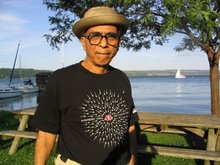
I suddenly had a desire to find out my bearing. My school days, a part of it, was spent in this neighbourhood. It was 1944 .The shadow of famine, destitution, the Second World War, sandbagged baffle wall, overwhelming black-out nights... were in a deep embrace with Calcutta’s (now Kolkata) life. In the midst of this came world’s most devastating famine. Five million perished within less than two years. The eatery where all this eating was going on in great gusto where after a week Kolkata’s one of the grandest Durga puja, Ekdalia Ever Green club’s Puja was going to be performed, there existed a patch of triangular green fenced off with iron spikes with a small opening. There were a couple of swings and a few wooden benches. People, particularly the elderly and the children used to spend sometime here in the afternoon. Then from some where people started pouring around this what was then called Temporary Park. Some already dead, some were dying. A few who could manage to move, went out routinely for begging, not rice, but for "fan" the slightly starchy water that's released when rice is cooked. People, generally had lost the generosity of parting with a fistful of rice. It was durviksha or famine, when beggars are driven away. Hordes of people, indeed mere processions of skeletons wrapped in skin were moving about in search of food. A mature woman and a man were indistinguishable from secondary sexual features, because there was none that was visible. Everyday they were dying around Temporary Park, every where, in all places. All such places were reeking with a strange smell that only can emanate from dead and drying human bodies. I had a feeling this smell was there all over the country. It was years afterwards that I could forget that particular smell.
Never again I saw such a sight in my seventy-odd years of life. Kolkata was roaring around with American left-hand drive open-hood jeeps, well fed US troops, African-Americans among them a remarkable sight at that time. Gariahat as well as other Kolkata markets were also well stocked with food. Middle and upper class Calcuttans were collecting their requirements with wallets full of war-time paper currency. Only, mindlessness had climbed to a horrible height. As if these deaths and destitution were of no consequence. Famine became only a word for academic discussion. Such things will pass was the attitude. But, although small, a determined band of people were fighting this degeneration. With whatever they had, they plunged into famine relief work. Jainul Abedin’s famous drawings and paintings, Sunil Jana’s wonderful photographs, Bijon Bhattacharya’s plays, Nabanna and others, Jyotirindra Maitra’s Nabajibaner Gan and a plethora of other works tried with steeled determination to stave off demoralization. Then there was the flower of India’s humanism -- Indian People’s Theater Association (IPTA), Progressive Writers’ and Artists’ Association. It is true that with only relief, songs and dramas you cannot reverse this massive torrent of famine and deaths. But yet this effort galvanized into a robust movement for restoration of self esteem, dignity and whatever that was still good within us. It had a highly humanizing effect. Outstanding political individuals, singers, artists, photo journalists, all came together. Their songs, plays, poetry sessions, speeches, wonderful posters prepared inexpensively but with deep passion traveled across cities, villages, and everywhere. The great tragedy had united all shades. In the backdrop was the worldwide antifascist unity of humanity. It was a golden time. People were ready to give every bit of best things they had.
I did not see the Indian freedom movement-era Dundee March, Non-cooperation or Civil Disobedience movements. But what I saw in this resurgence remained the abiding resource throughout my whole life. Just when the independence movement was getting into full throttle culminating into revolt in the Royal Indian Navy, that glorious feeling was snapped. Vicious communal riots cast its shadow all over the country. Horrible slaughter, history’s largest exodus, the country parted into two hostile entities. The moment of glory came within attainable reach and departed without anybody regretting it. Life became mundane with basketful of convoluted philosophies. For the middle classes there no longer existed any noble agenda.
Big degree, big job, big money. The ashes of burnt dreams filled up the air.
Well, at the restaurant we visited, meanwhile the food had arrived. Lovely boneless pieces of Hilsa steam-cooked in mustard paste and mustard oil garnished with green chillies. The aroma of Dehradun rice filled the air. A glass of whiskey would have been very satisfying .What else? Memories still lingered.
Photo from Internet. See economist Amartya Sen's book on the topic: http://books.google.co.in/books?id=FVC9eqGkMr8C&dq=amartya+sen+famine&printsec=frontcover&source=bn&hl=en&sa=X&oi=book_result&resnum=4&ct=result







3 comments:
Baba,
i have posted your article on my Facebook. Really touching account. Mayve a detailed discussion later on this.
N
Amiable post and this enter helped me alot in my college assignement. Thanks you on your information.
Salutes to your father!
This was the manmantar, when people walked into the cities, died of eating leaves and strange roots, and begging without effect... it happened just before I was born. There are plenty of stories though, "fen chai ma!"
WW-II stole every morsel of food that would have otherwise gone to the poor..
Post a Comment